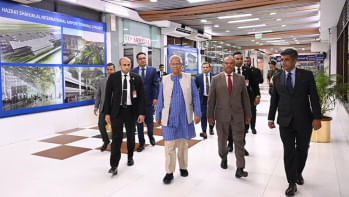IMF warns of revenue leakage
The government's decision to have multiple rates under the new VAT law poses significant risks of revenue leakages, said the International Monetary Fund in a recent report.
The law, which was framed at the prescription of the IMF with a view to boosting revenue collection in the country that has the lowest tax-GDP ratio in South Asia, insisted on a uniform 15 percent VAT rate on all goods and services in Bangladesh save for 15 items.
But the 15 percent single rate drew the ire of the business community and certain sections of the society, whose fervent opposition delayed the implementation of the VAT and Supplementary Duty Act 2012 several times.
Now, in a bid to appease them, the government has come up with multiple VAT rates of 5 percent, 7.5 percent, 10 percent and 15 percent.
“The experience of many countries with a multi-rate VAT system is that it is more vulnerable to significant revenue leakages,” said the IMF report prepared by a technical mission that visited Dhaka from March 11-24.
The report was submitted to Finance Minister AHM Mustafa Kamal earlier this week.
Taxpayers selling goods chargeable at different rates often misclassify goods, either accidentally or deliberately, and report VAT outputs at lower rates than the law requires, the report said.
A single rate VAT structure, with few exemptions, is most apt to facilitate compliance and ensure high revenue efficiently.
Furthermore, multiple rates give rise to many administrative complications and impair the revenue administration's ability to efficiently enforce the legislation. Subsequently, the Washington based-lender suggested analysis of the fiscal impact before amending the VAT and Supplementary Duty Act 2012.
The IMF team's opinions come just two months before the planned implementation of the Act from July 1 after a two-year deferral.
IT systems will have to be adapted to the new system and accordingly incorporate the recently announced changes and will need to be fully tested in advance of the launch of the new system.
“The NBR has much to do in a short time in order to ready for the implementation of the VAT reforms,” the report said, citing the need for drafting relevant provisions for any changes in the law.
VAT is the biggest source of revenue for the government.
The World Bank earlier said the implementation of the new VAT law under an automated environment would increase the VAT to GDP ratio by at least one percentage point of GDP by 2019. In the fiscal year of 2012-13, the ratio was 3.7 percent.
Subsequently, the government took up a $60 million project to automate the VAT administration.

 For all latest news, follow The Daily Star's Google News channel.
For all latest news, follow The Daily Star's Google News channel. 



Comments